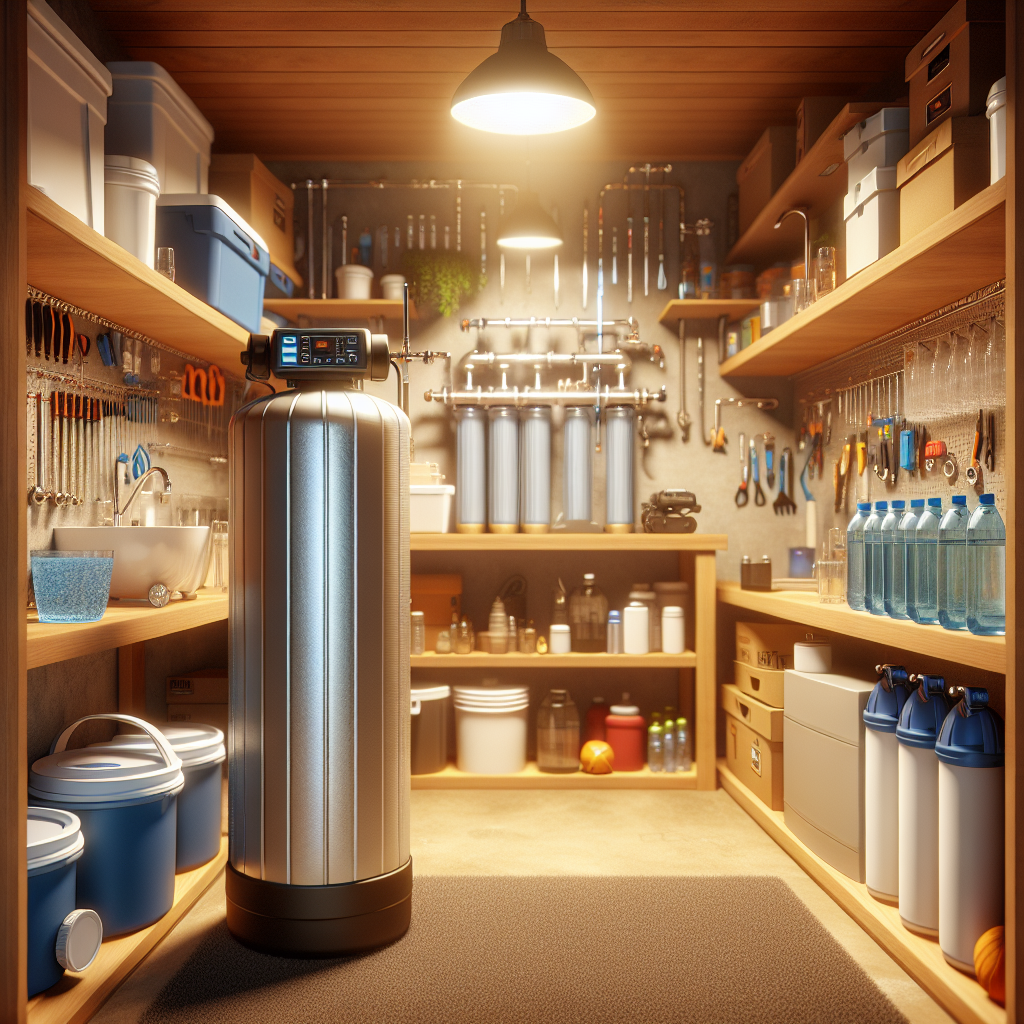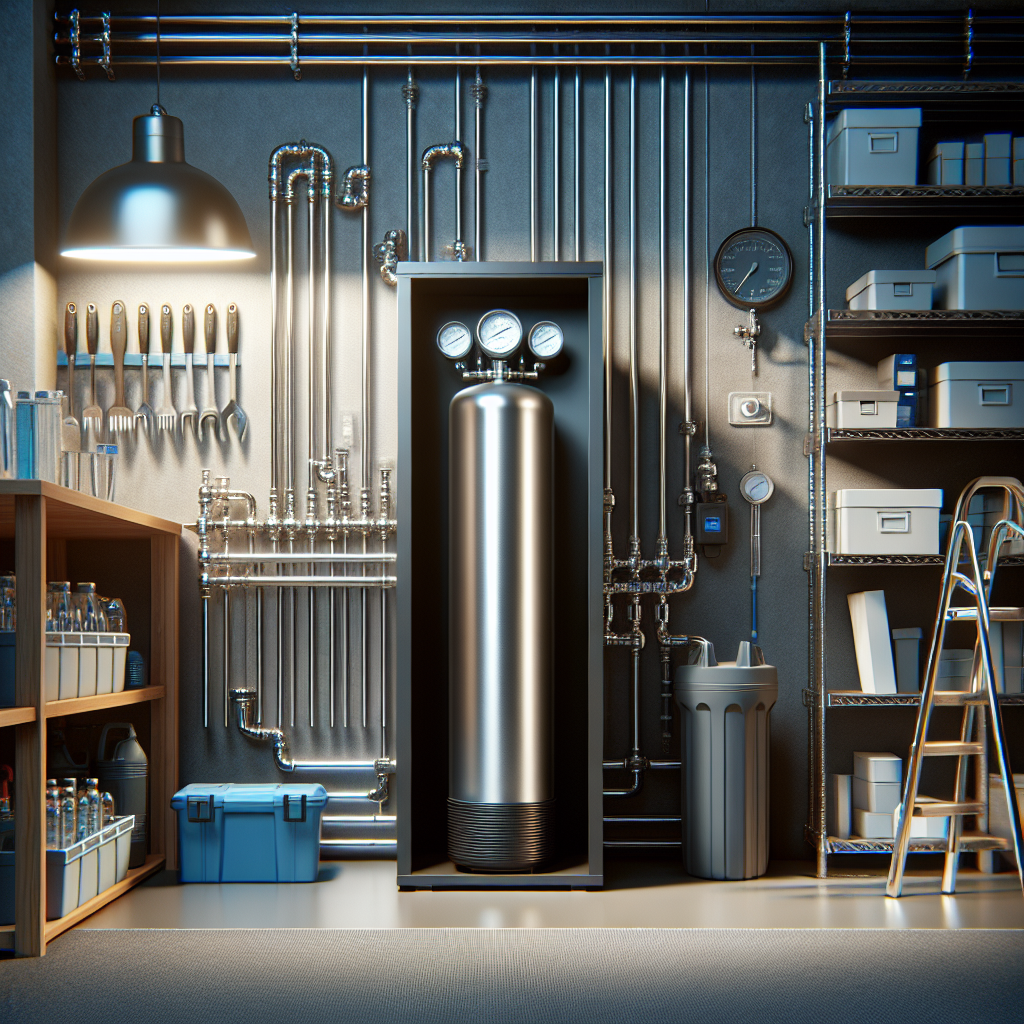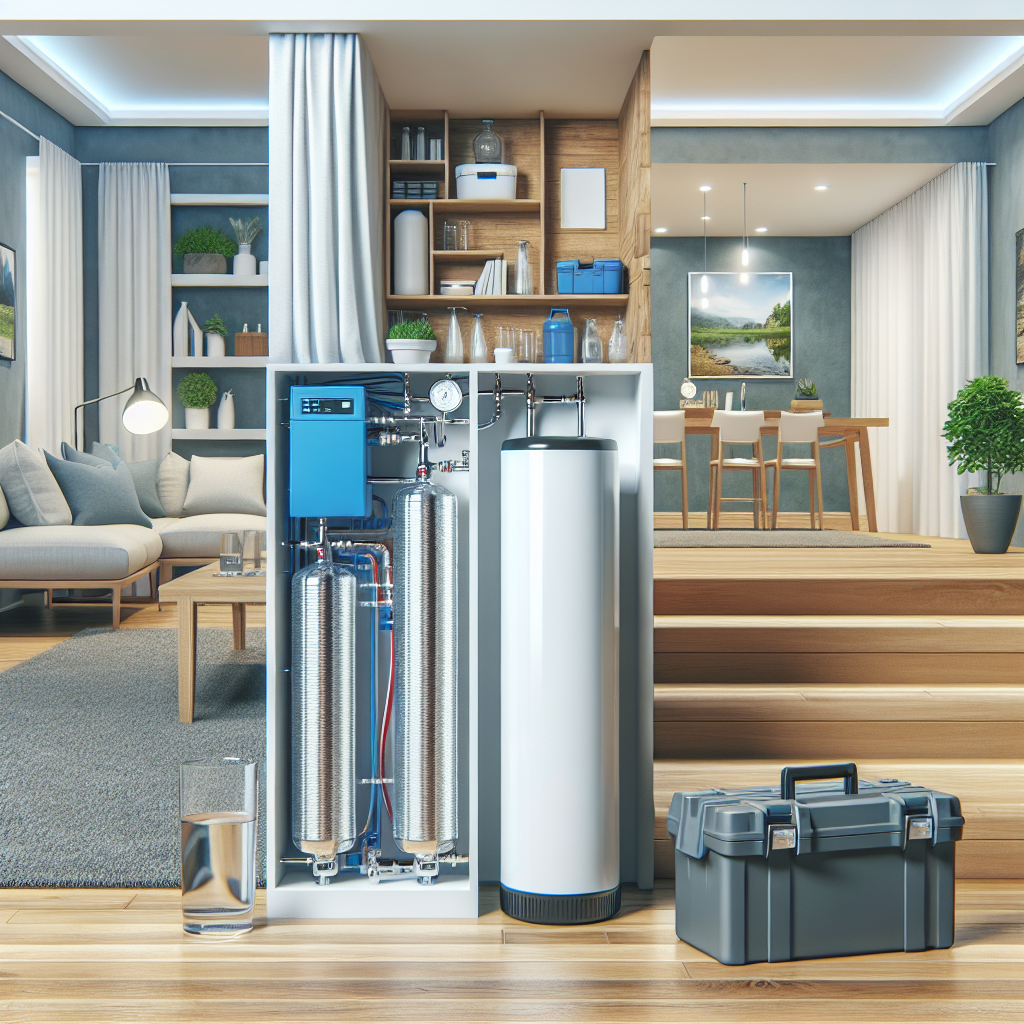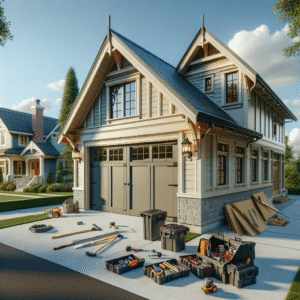If you’re considering ways to improve your home’s water quality, installing a whole-house water softener might just be the solution you need. Water softeners are designed to remove minerals like calcium and magnesium, which cause water hardness, a common issue in many households. This introductory guide will help you understand what water softeners are, how they work, and the myriad benefits they can bring to your home and daily life.
Understanding Water Softener Systems: What They Are and How They Work
Water softeners are systems that treat hard water through a process called ion exchange, which removes minerals responsible for causing hardness. This not only prevents scale buildup in your plumbing but also enhances the efficiency and lifespan of your home appliances. By exchanging hard ions like calcium and magnesium with softer ones like sodium or potassium, water softeners ensure that the water throughout your house is gentler on everything from your skin to your laundry.
Top 5 Benefits of Installing a Whole-House Water Softener
- Extended Appliance Life: Soft water lacks the mineral buildup that can harm your appliances, meaning they can run better for longer.
- Efficient Cleaning: Say goodbye to spots on your glasses and silverware; soft water reduces soap residue and cloudiness on dishes.
- Softer Skin and Hair: Soft water can help to alleviate dry skin and hair by allowing moisture to be better retained.
- Reduced Plumbing Issues: By minimizing scale buildup, soft water helps maintain clear and functional pipes.
- Cost Savings: With less scale and scum to contend with, you’ll use less soap and detergent, saving money and reducing environmental impact.
Choosing the Right Water Softener: Factors to Consider for Your Home
When deciding on a water softener, consider factors such as size, type, and features. The size of your home, the number of occupants, and your overall water usage patterns are crucial in determining the capacity of the softener you need. Additionally, you’ll want to choose between salt-based and salt-free systems depending on your personal preference and specific home requirements.

If you’re ready to take your home improvement or construction project to the next level, we can help! Find trusted contractors on BuildNet, whether you’re looking for renovations, new builds, electrical work, plumbing, or anything in between. Our directory connects you with qualified professionals who can make your vision a reality.
Understanding Water Softener Systems: What They Are and How They Work
Hey there! If you’ve ever noticed spots on your dishes after washing, felt your skin unusually dry after a shower, or struggled with limescale buildup in your appliances, you might be living with hard water. But don’t worry, a water softener system can be a game-changer for your home. Let’s dive into what water softeners are and how they work to make your water woes disappear.
What is a Water Softener?
A water softener is a household system designed to remove minerals like calcium and magnesium from your water. These minerals are responsible for what we call ‘hard water,’ which can cause a variety of annoyances and problems in domestic settings. By installing a water softener, you can transform your hard water into ‘soft water,’ which is gentler on everything in your home, from your skin to your pipes.
How Does a Water Softener Work?
The magic of water softening happens through a process called ion exchange, which might sound complex but is quite fascinating once you get to know it. Let’s break it down:
The Basics of Ion Exchange
In simple terms, ion exchange is a process where the unwanted minerals in your water (calcium and magnesium) are swapped for something less problematic (usually sodium or potassium). This swap is made possible by a mineral tank filled with small, negatively charged resin beads. These beads attract and hold onto positively charged minerals passing through.
Regeneration: Keeping the System Effective
After some time, the resin beads in the tank get saturated with calcium and magnesium ions. When this happens, the system needs to regenerate or refresh itself. During regeneration, a strong brine solution is flushed through the tank. The high concentration of salt in the brine forces the calcium and magnesium off the beads, replacing them with sodium ions. The unwanted minerals are then flushed out of the system, and the beads are ready to soften more water.
Key Components of a Water Softener System
- Mineral Tank: This is where the action happens – water flows through this tank and the ion exchange process softens it.
- Control Valve: Measures the amount of water passing through the mineral tank and initiates regeneration when needed.
- Brine Tank: Holds a mixture of salt and water used to regenerate the resin in the mineral tank.
Manual vs. Automatic Water Softeners
Water softeners come in both manual and automatic varieties. Manual systems require you to physically start the regeneration process, which can be a bit of a hassle. On the other hand, automatic softeners are equipped with timers or meter-based control systems that automatically determine when regeneration is necessary. This hands-off approach makes automatic water softeners a popular choice among homeowners.
Type of Salt Used in Water Softeners
Choosing the right type of salt can impact the efficiency and longevity of your water softener. Most systems use either:
- Sodium Chloride: Available in pellets or crystals, it is the most common choice and usually the most cost-effective.
- Potassium Chloride: An alternative for those concerned about sodium intake, though it is more expensive and may not be as readily available.
Do You Need a Water Softener?
If you’re noticing signs of hard water in your home, such as scale buildup on appliances, stiff laundry after washing, or a filmy residue on your body and hair, it might be time to consider a water softener. Not only can it prolong the life of your plumbing and appliances, but it can also make cleaning easier and more efficient. Plus, it’s a great way to enhance your home’s water quality, making it softer and more pleasant for daily use.
Tips for Maintaining Your Water Softener
- Check Salt Levels Regularly: Ensure there’s always enough salt in the brine tank, but avoid overfilling.
- Clean the Brine Tank Annually: This prevents salt buildup and keeps the system running smoothly.
- Look Out for Salt Bridges: Sometimes, a hard crust forms in the brine tank, creating a gap between the water and the salt. This can be broken gently using a broom handle.
Understanding your home’s water softener system isn’t just about handling hard water; it’s about improving your quality of life. From softer laundry and smoother skin to longer-lasting appliances, the benefits are substantial. So why not give your water—and your home—a soft touch? Your dishes, and possibly your family, will thank you!

Top 5 Benefits of Installing a Whole-House Water Softener
Ever felt curious about what transforming your home’s water supply could do for you? Let’s dive into the sparkling world of whole-house water softeners and discover the top benefits they offer. By understanding these, you’ll not only enhance your home’s functionality but also improve daily living, all while making a smart investment in property upkeep.
1. Say Goodbye to Hard Water Issues
First and foremost, installing a whole-house water softener tackles the core issue: hard water. This is your ultimate solution to combat the minerals like calcium and magnesium that make water “hard.” These minerals are notorious for causing scale buildup in pipes and on appliances, potentially leading to costly repairs. A water softener removes these minerals, replacing them with sodium through a process called ion exchange. This means clearer pipes, fewer plumber visits, and a smoother operation in your water-using appliances.
Localized Spotlight: Improved Longevity of Plumbing in Hard Water Areas
In areas with particularly hard water, such as parts of Utah or Arizona, the impact on plumbing systems can be severe. A whole-house water softener is not just a nice-to-have but a must-have in these regions to protect your home infrastructure.
2. Enhanced Appliance Efficiency and Lifespan
Ever wondered why your dishwasher or laundry machine doesn’t perform as well as it once did? The culprit might be hard water. With a whole-house water softener, your appliances can avoid the scale buildup that hampers efficiency and leads to premature aging. That means your appliances will not only run better but they’ll last longer too. Imagine the savings you could achieve over time with this one investment!
Real-World Example: Energy Savings
Consider a water heater—it operates far more efficiently on soft water. The absence of mineral buildup allows the heating element to transfer heat more effectively, which translates to lower energy bills each month. Over a year, that can add up to substantial savings, especially in colder climates where water heaters work overtime.
3. Softer Skin and Cleaner, Softer Laundry
It’s not just your appliances that benefit from soft water—your own body does too! Hard water can leave skin feeling dry and hair looking dull because soap doesn’t lather as well and tends to leave behind a residue. Soft water, on the other hand, can contribute to softer skin and smoother hair because it allows soaps and shampoos to lather more effectively and rinse out more completely. Plus, your clothes will thank you as they come out cleaner and softer from the laundry, retaining their color and texture.
User Testimonial: A Personal Touch
“Switching to a whole-house water softener changed my life. My skin and hair have never felt better, and my clothes last longer too!” – Emily R., Homeowner in Minneapolis
4. Better Tasting Water
While many people focus on the health and maintenance benefits of water softeners, let’s not forget one simple pleasure: better tasting water! Removing the harsh minerals often eliminates the odd tastes and smells associated with hard water. This means more enjoyable drinking water, clearer ice cubes, and a better overall dining experience at home. If you enjoy cooking, soft water can also improve the taste of food prepared with water, such as pasta and soups.
Culinary Tip: Perfect Recipes
Using soft water can actually affect the outcome of your favorite recipes. Hard water can interfere with the formation of doughs and batters and can alter the expected tastes of brewed beverages like coffee and tea. Soft water brings out the intended flavors and can make a noticeable difference in culinary ventures.
5. Environmentally Friendly and Cost-Effective
Last but not least, a whole-house water softener is an environmentally friendly choice. By enhancing appliance efficiency and reducing the need for repair and replacement, you’re not only saving money but also reducing waste. Moreover, using less detergent and soap contributes to lesser wastewater and environmental pollution. It’s a small step that contributes to a larger environmental benefit, and who doesn’t want to feel good about making eco-friendly choices?
Economic Insight: Less Is More
From a financial perspective, while the upfront cost of a water softener system may seem significant, the long-term savings on appliance wear and tear, plumbing repairs, utility bills, and cleaning supplies can truly add up. Many homeowners find that the system pays for itself within a few years.
Choosing the Right Water Softener: Factors to Consider for Your Home
Hey there! If you’re considering installing a water softener in your home, you’re making a move towards not only protecting your appliances but also improving your daily living. However, picking the right water softener isn’t just about grabbing any unit off the shelf; it involves understanding your specific needs and the various options available. Let’s dive into what you should consider to make the best choice for your home.
Understanding Your Water Hardness Level
The first step in choosing the right water softener is to know the hardness of your water. Water hardness is measured in grains per gallon (gpg) or milligrams per liter (mg/L). You can get a water test kit from your local hardware store or request a test from a professional water testing service. Knowing the exact hardness level of your water will help you select a softener that can handle the mineral load effectively.
Size and Capacity of the Water Softener
When it comes to water softeners, size does matter! But instead of physical dimensions, we’re talking about the unit’s capacity to remove hardness minerals from your water before needing regeneration. A too-small unit will regenerate more often, wasting water and salt, whereas a too-large unit could lead to inefficient use and increased maintenance. A good rule of thumb is to multiply the number of people in your household by the gallons of water used per person per day (average is about 75 gallons), then multiply this number by your water hardness level. This calculation will give you an idea of the daily softening demand of your household.
Type of Water Softener
Water softeners generally come in two main types: salt-based and salt-free. Salt-based water softeners are highly effective at removing hard water minerals and are ideal for areas with high water hardness levels. On the other hand, salt-free water softeners use a process called Template Assisted Crystallization (TAC) to condition the water, preventing minerals from depositing as scale. Although they don’t physically remove minerals, they are ideal for those who are concerned about sodium intake or have minor water hardness issues.
Regeneration Style
How a water softener regenerates is another crucial factor to consider. Timer-based models regenerate on a set schedule, regardless of water usage, which can lead to either wasted salt and water or periods where the water isn’t fully softened. Metered models, or demand-initiated regeneration systems, measure water usage and regenerate only when needed. This type is more efficient and economical over time, making it a preferred choice for many households.
Features and Controls
Modern water softeners come with various features that can enhance user experience and efficiency. Look for models with user-friendly controls, such as LCD displays that show important information like current water flow rate and salt levels. Some units also come with advanced features like vacation mode settings which conserve resources when you’re not home. Consider what features are important to you and which ones would actually be useful in your daily life.
Installation and Maintenance
Before making a purchase, consider the installation and maintenance requirements. Some water softeners may be more complex to install and could require professional help, which can be an additional cost. Also, think about the ease of maintenance. For instance, how easy is it to refill the salt or change the filters? A unit that’s cumbersome to maintain might be less likely to be cared for properly, affecting its efficiency and lifespan.
Cost and Warranty
Of course, cost is a significant factor in any home improvement decision. While cheaper models might be tempting, they often come with fewer features and potentially higher running costs. Consider the unit’s total cost, including installation, maintenance, and operational costs. Also, don’t overlook the warranty—this can provide peace of mind and protect your investment in the long run. A longer, more comprehensive warranty might be indicative of a better-quality product.
Local Water Conditions and Regulations
Last but certainly not least, consider your local water conditions and any relevant regulations. For instance, some regions have restrictions on salt-based softeners due to their environmental impact. It’s wise to check with local regulations before making your decision. Additionally, understanding the specific contaminants in your local water supply can guide you towards a water softener that addresses those concerns.
Choosing the right water softener can seem daunting, but understanding these key factors will help you make an informed decision. Remember, the ideal water softener for your home will efficiently manage the water hardness, align with your home’s usage patterns, and fit within your budget, all while meeting local regulations. Here’s to softer water and happier living!

What is a Water Softener and How Does It Work?
A water softener is a system designed to remove minerals like calcium and magnesium from water, which are primarily responsible for water hardness. It uses a process called ion exchange: hard water passes through resin beads in the softener tank, which are coated with sodium ions. These sodium ions swap places with the hardness ions in the water, thus softening it. After some time, the system regenerates, washing the trapped minerals away and recharging the beads with sodium.
Why Should I Consider Getting a Whole-House Water Softener?
Installing a whole-house water softener can significantly improve the quality of water throughout your home. It eliminates scale buildup in pipes and appliances, extends the lifespan of plumbing systems, and enhances the effectiveness of soaps and detergents. This results in softer laundry, cleaner dishes, and less soap usage.
What are the Top Benefits of Installing a Water Softener?
- Extended Appliance Life: Water softeners prevent the buildup of mineral deposits in appliances, thereby extending their lifespan.
- Efficient Cleaning: Soft water enhances the lathering of soap, resulting in cleaner dishes, clothes, and surfaces with less effort.
- Reduced Plumbing Issues: By minimizing scale buildup, soft water helps maintain efficient water flow and reduces the risk of clogs and corrosion in pipes.
- Better Skin and Hair: Soft water can help reduce dryness and irritation in skin and hair by preventing the buildup of minerals during washing.
- Cost Savings: Less scale buildup means fewer plumbing repairs, less detergent usage, and lower energy consumption by heating systems.
How Do I Choose the Right Water Softener for My Home?
Choosing the right water softener depends on several factors including your household size, water usage, and the hardness of your local water supply. It’s important to select a system that can handle the water demands of your family without frequent regeneration. Consulting with a local contractor can provide personalized advice based on your specific circumstances.
Are Water Softeners Environmentally Friendly?
Water softeners can be both beneficial and challenging for the environment. While they reduce the need for chemical cleaning products, they do increase sodium levels in wastewater. Choosing a system with efficient regeneration cycles and considering alternative softening agents like potassium can help mitigate these effects.
What Maintenance Does a Water Softener Require?
Regular maintenance of a water softener includes checking the salt level in the brine tank, cleaning the tank periodically, and ensuring the resin beads are functioning properly. Most water softeners also require periodic servicing by a professional to ensure optimal performance.
Can I Install a Water Softener Myself?
While it’s possible for DIY-savvy homeowners to install a water softener, professional installation is recommended. This ensures that the system is set up correctly and adheres to local building codes and regulations. A professional can also offer valuable insights on the best type and size of softener for your needs.
How Much Does a Water Softener Cost?
The cost of a water softener varies based on the type, size, and features of the system. Generally, prices range from a few hundred to several thousand dollars. Installation costs vary by location and the complexity of the setup. For an accurate estimate, it’s best to consult local contractors.
Conclusion
Investing in a whole-house water softener is a wise decision that can enhance your daily life and protect your home’s plumbing infrastructure. From softer skin and cleaner clothes to more efficient appliances and lower energy bills, the benefits are extensive. If you’re considering a water softener but need more guidance or a precise quote tailored to your home, don’t hesitate to reach out to a contractor on our BuildNet website. Our network of experienced professionals is ready to help you choose the perfect system for your needs and handle the installation hassle-free. Remember, a quick consultation could lead to long-term benefits for your home, so connect with us today for a free quote!







